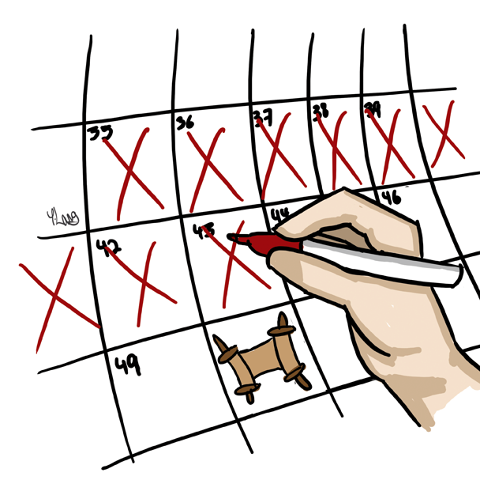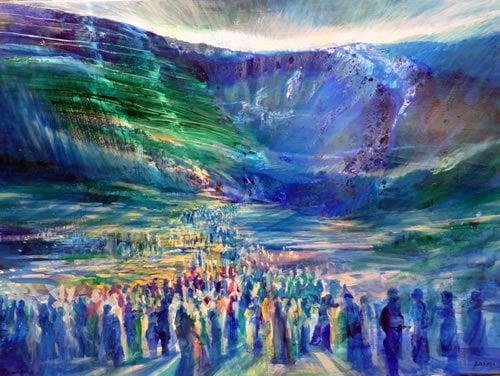Bonjour / Hello [nickname_else_first_name],
SEFIRAT HAOMER BOOKLET
Isaac Darwiche has put together this years booklet for Sefirat Haomer which can be found here
CLICK HERE to Download the MA SFIRAT HA'OMER booklet
Counting of the Omer (Hebrew: סְפִירַת הָעוֹמֶר, Sefirat HaOmer, sometimes abbreviated as Sefira or the Omer) is an important verbal counting of each of the forty-nine days starting with the Wave Offering of a sheaf of ripe grain with a sacrifice immediately following the commencement (Hebrew: רֵאשִׁית, reishit) of the grain harvest, and the First Fruits festival celebrating the end of the grain harvest, known as Feast of Weeks/Shavuot/Pentecost in Mosaic Law (Hebrew Bible: Deuteronomy 16:9–12, Leviticus 23:10–16); or in the varying current Jewish holidays traditions, the period between the Passover or Feast of Unleavened Bread, and Shavuot. This is the second of the three annual Mosaic Law feast periods.
This mitzvah ("commandment") derives from the Torah commandment to count forty-nine days beginning from the day on which the Omer, a sacrifice containing an omer-measure of barley, was offered in the Temple in Jerusalem, up until the day before an offering of wheat was brought to the Temple on Shavuot. The Counting of the Omer begins on the second day of Passover (the 16th of Nisan) for Rabbinic Jews (Orthodox, Conservative, Reform), and after the weekly Shabbat during Passover for Karaite Jews, and ends the day before the holiday of Shavuot, the 'fiftieth day.'
- Wikipedia

Table of contents
1) Perashat Hashavoua - Rabbi Eli Mansour
2) Halakhat Hashavoua (Halakhot related to day to day life) By Hazzan David Azerad -
The Mitzvah to Tell the Exodus Story on Pesaḥ Night -peninei halacha
3) Holy Jokes!
4) For KIDS

This Week's Parasha Insight with Rabbi Eli Mansour
Pesah- Its A Mirage
The first of the ten plagues which G-d brought upon the Egyptians was "Dam" – the plague of blood, when G-d transformed the water in the river to blood. The Torah (Shemot 7:21) tells that as a result of this plague, all the fish in the river perished, causing the river to emit an offensive odor – "Va’yib’ash Ha’ye’or."
Rav Avrohom Schorr (contemporary), in his He’lekah Ve’ha’libub commentary to the Haggadah, cites the Sefas Emet (Rav Yehuda Aryeh Leib Alter of Ger, 1847-1905) as explaining the symbolic significance of this aspect of the plague. He writes that Beneh Yisrael sensed the "stench" of the land of Egypt, and recognized that they could no longer remain there. Earlier, when Moshe had conveyed to them G-d’s promise of redemption, they did not listen (6:9). But now they began realizing that they could not live in the decadent society in Egypt, and this is the meaning of "Va’yib’ash Ha’ye’or" – that they could no longer tolerate the "stench" of the impurity of the society among which they resided.
Rav Schorr added that fish are sometimes used as a symbol for physical desires. When Beneh Yisrael were in the desert and complained about the manna, longing to enjoy a variety of food, they reminisced about the fish that they were fed in Egypt ("Zacharnu Et Ha’daga" – Bamidbar 11:5), and the Sages explained that Beneh Yisrael on that occasion were also complaining about the Arayot (restrictions on intimate relationships). Fish, then, are a symbol for unrestrained indulgence in physical pleasures. As the plagues began, the "fish" of Egypt "died" in the eyes of Beneh Yisrael. The people began to realize that the pleasures which the society around them celebrated and pursued were just a mirage, that the joy they bring is temporary and not real, and that the decadent lifestyle the people around them lived was actually "malodorous," and not something to be embraced.
Rav Schorr explained on this basis the Midrash’s depiction of Beneh Yisrael and Egyptians drinking during the plague of blood. The Midrash relates that even if someone from Beneh Yisrael was drinking from the same cup as an Egyptian, he would receive water, but the Egyptian would receive blood. Rav Schorr writes that this symbolizes Beneh Yisrael’s changed perspective. They now viewed wanton physical indulgence differently than the Egyptians did; although they lived with the Egyptians, they had a very different outlook and a very different attitude.
The Yeser Ha’ra (evil inclination) seeks to mislead us by showing us a mirage. Forbidden activity appears to us as something valuable and important, as something we need to indulge in, which will bring us joy and satisfaction, when in truth, it is valueless and even harmful. We need to try to change our perspective, and regard forbidden pleasures as "malodorous," as something to reject and stay away from, so that we, like our ancestors in Egypt, will be worthy of our final redemption, speedily and in our times, Amen.

Halachot this week are selected and Translated by Hazzan David Azerad
From the Archives
OMER
The Sefirat (counting) Ha-Omer lasts 49 days (7 weeks ) . We starts counting on the 2nd day of Pesach till one night before Shabuot.There are
different customs during that period regarding Cutting Hair,Weddings,Music,and more.The Sephardim do not take hair cuts or in some instances shave, till the 34th day of the Omer unlike the Ashkenazim who takes hair cut & shave on the 33rd day,which is Lag Baomer.This Avelut (Mourning)period is based on the death of 24000 students of Rabbi Akiba.For ladies,it is our custom not to be Mahmir(stringent)on taking hair cuts during Sefirat Ha-Omer,they are allowed to take a hair cut.Ladies also should not make Sefirat Ha-Omer,not with or without the Berakha(blessing),as per Ben Ish Hay,he explains that according to Kabala,there is no reason for Ladies to count at all,the Kaf Hachayim and other Hakhamim come down with the same opinion.
As per Sephadic customs also,one should not make weddings until the night of the 34th of the Omer ,the same as the hair cut rule.It is also a good custom not to go swimming , take dangerous risks, or listen to music till Lag Ba-Omer ,which is the day of the Hilulah(tribute)of Rabbi Shimeon Ben Yuhay,Z"L.So we do celebrate that day as a Holiday,because of the impact of Rabbi Shimeon,Z'L.and his Zohar.The books bring down how you are suppose to enjoy that 33rd day of the Omer,so we d listen to Kosher music Likhbod(in Honor) the Hilula of Rabi Shimeon Ben Yuhay.Z"L.
Bejamin Khadoury z'L
3) HOLY JoKeS!!
Selection of funny snippets, loosely related to this weeks parashah or current events, to brighten your day
If a doctor carries a black bag and a plumber carries a tool box, what does a mohel carry?
A Bris-kit!
Why do we have a Haggadah at Passover?
So we can Seder right words.
What do you call someone who derives pleasure from the bread of affliction?
A matzochist.
A Jewish man took his Passover lunch to eat outside in the park. He sat down on a bench and began eating. Since Jews do not eat leavened bread during the eight-day holiday, he was eating Matzo, flat crunchy unleavened bread that has dozens of perforations. A little later, a blind man came by and sat down next to him. Feeling neighborly, the Jewish man passed a sheet of matzo to the blind man. The blind man handled the matzo for a few minutes, looked puzzled, and finally exclaimed, "Who wrote this nonsense?"
Did you hear about the gefilte fish that went deaf?
He had to buy a herring-aid.
4) FOR KIDS
Click on the image to open the youtube video















